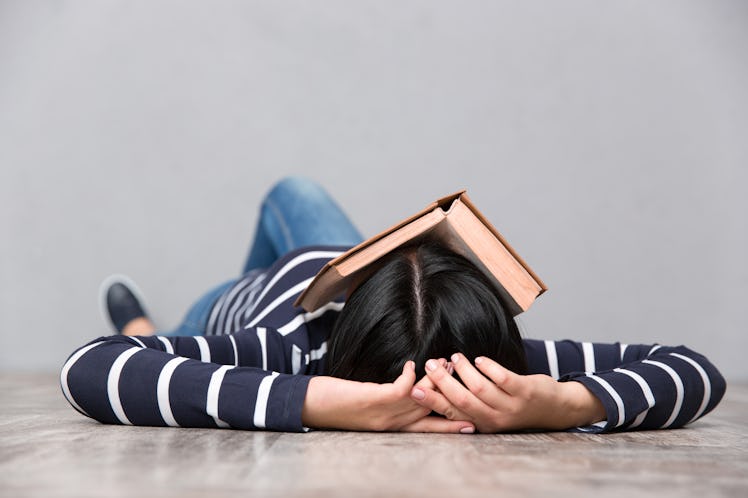
This One Sleeping Position Sounds Awful, But People Say It Works For This Reason
I've recently come to terms with the fact that I'm a stomach sleeper, and apparently, it's like, the worst possible position for your back. With that in mind, I've been trying to figure out new and better ways to train my body to sleep so I can keep my spine nice and healthy. Interestingly, along with learning about more body-friendly slumber postures, I've come across some anecdotal information that sleeping on the floor is good for you. But is there actually evidence to support those anecdotes?
While it doesn't sound like a particularly cozy way to settle in for the night — at least to me, a person who needs multiple pillows and a mattress that feels like a baby cloud — there really are people out there who believe sleeping on the floor is superior to snuggling up in bed in any other position. In fact, there is some research to back up the whole idea, too.
Physiotherapist Michael Tetley published a paper in The BMJ, a peer-reviewed medical journal, which documented the findings of his sleep posture research around the world. Tetley found that "forest dwellers and nomads" actually struggle with fewer bodily injuries than "civilized" people, and on a related note, he also found that pillows were basically just unnecessary for a quality snooze. (That last one, I believe, is up for debate, Mike.)
Mindbodygreen writer Nathan Wiebe put these theories to the test for a five-week experiment of sleeping on the floor, and interestingly enough, he wound up with some pretty good results.
Believe it or not, Wiebe said that sleeping on the floor actually reduced stiffness in his body.
In fact, he hadn't realized how stiff he'd been feeling while sleeping in his usual bed, until he woke up and wasn't stiff anymore after snoozing on the floor. Huh!
However, there was one drawback to Wiebe's experiment. He wrote,
The only downside to sleeping on the floor is that sometimes the floor can be quite dirty and it also doesn’t look very appealing.
Men's Health writer Paul Kita also tried sleeping on the floor as part of an experiment. At the suggestion of Katy Bowman, M.S., an expert who specializes in "biomechanics and movement," according to Men's Health, Kita cozied up on a hard floor each night for a whole week. Bowman said to Kita that if you sleep on the floor, "you'll sleep better, achieve a deeper quality of sleep, and wake up feeling good." She also said "the aches and pains most people suffer after waking up are due to not moving for hours."
While Kita did admit that he felt a little less "knotty" in his body when waking up after a night of sleeping on the floor, he still proclaims his love for beds by the end of his experiment.
But the reason why sleeping in a traditional bed can make you feel so stiff partially has to do with the mattress itself, and the fact that most of us are sitting on soft things all the damn time.
Bowman explained to Kita that a soft mattress makes it a lot harder to move around during the night, weakening your muscles and keeping you in one spot. While Kita noticed benefits in his energy and soreness, he also noted just how appreciative he was to get back in his soft bed.
Oh, and BTW, if you wanted to try this new sleep position out for yourself, you can start by padding the floor with something like a yoga mat, a blanket, or a little memory foam sleep pad. The benefits you're getting from the floor's hard surface will still come through until you're ready to go all floor, all night long.
Mind you, Wiebe and Kita's stories are far from the only accounts on the internet of having positive results with sleeping on the floor. Trust me, there are plenty of anecdotally reported benefits about it out there to be found.
But is that enough to give it a shot? Well, I just don't know, guys. If you're considering it, it's always best to talk to your doctor about any health concerns you might have, or anything else that may be holding you back from trying it out. And while all these online experiments seem pretty positive, for now, I think I'm personally just going to stick with trying to sleep on my back so that my spine and neck can be in a neutral position. But hey, baby steps, right?